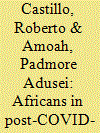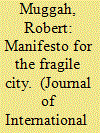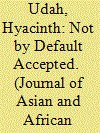|
|
|
Sort Order |
|
|
|
Items / Page
|
|
|
|
|
|
|
| Srl | Item |
| 1 |
ID:
173175


|
|
|
|
|
| Summary/Abstract |
In this article, we reflect on critical questions relating to the future of African migration to China in the post-COVID-19 world at the backdrop of the mistreatment many Africans received as part of the pandemic control in China. These questions include: Is this the end of African migration to China as we know it? Will COVID-19 fundamentally change how we think about migration, mobility and wellbeing in the People’s Republic of China (PRC)? What will be the effect of the post-COVID-19 regime on the social identity and wellbeing of the African diaspora in Guangzhou and other Chinese cities?
|
|
|
|
|
|
|
|
|
|
|
|
|
|
|
|
| 2 |
ID:
104475


|
|
|
| 3 |
ID:
116252


|
|
|
|
|
| Publication |
2012.
|
| Summary/Abstract |
This article examines the British response to the onset of guerrilla warfare launched by the Boers in March 1900. It argues that although Britain had signed the Hague Convention in July 1899, the two commanders, Lords Roberts and Kitchener, combated this unprecedented challenge with their own notions of what constituted 'civilised warfare' or 'the usages of war'. They did not concern themselves with winning 'hearts and minds', and both commanders used destructive measures against the civilian population, either to punish them for helping the guerrillas, or to turn them against those still fighting. Kitchener implemented a thorough strategy based on the destruction of farms and livestock and on imprisoning Boer and African families in what became known as 'concentration camps'. Although the 'collective punishment' of civilians was against the Hague Convention, the British utilised such methods to destroy the independence of the Boer republics. The article also suggests that the nature of the guerrilla war undermines any claim that it was fought in a 'gentlemanly' manner, and shows that in British Cape Colony, rebels were dealt with by martial law and the use of African collaborators, to the detriment of civil governance and the racial hierarchy.
|
|
|
|
|
|
|
|
|
|
|
|
|
|
|
|
| 4 |
ID:
138408


|
|
|
|
|
| Summary/Abstract |
After more than a century of steady city expansion in northern countries, the direction of twenty-first century population growth is shifting southwards. Over the next five decades, Africans, Arabs, and Asians will migrate in unprecedented numbers to cities, especially to their slums. Many of these urban settlements are insecure, disorganized, and violent. These are fragile cities and such migrations can threaten their inhabitants, countries, and the wider neighborhood. The analytical focus on fragile cities offers a novel scale when compared to fragile and failing states. It is also one that is preoccupying national policymakers, military strategists, and development experts. Drawing on theoretical and empirical contributions from geography, criminology, and sociology, this article identifies four mega-risks shaping urban fragility—the transformation and concentration of violence, turbo-urbanization, youth bulges, and the relentless penetration of new technologies. It also considers successful approaches to reversing city fragility, including twinning fragile cities with healthier and wealthier ones, investing in hotspot policing, interventions addressing at-risk youth, support for inclusive and cohesive urban growth, and the targeted application of new technologies.
|
|
|
|
|
|
|
|
|
|
|
|
|
|
|
|
| 5 |
ID:
159768


|
|
|
|
|
| Summary/Abstract |
In the face of the increasing migration of black Africans to Australia, this paper seeks to raise conversations about the meta-discourses of Otherness in the Australian society. The paper aims to provide insights into black Africans’ experience of othering and being othered in Australia. The paper draws from a broader study which examined the lived experiences of Africans in South East Queensland and highlights that the presentation of white as norm in Australia, one of or the institutional and social contexts that create conditions reinforcing othering practices, is perpetuated, especially, when the racial order in society is not acknowledged and challenged. The paper proposes that the condition of Africans in Australia may not just be explained by their immigration status or their lack of skills but linked to how they are positioned and constructed in Australia as visible ‘Others.’
|
|
|
|
|
|
|
|
|
|
|
|
|
|
|
|
|
|
|
|
|